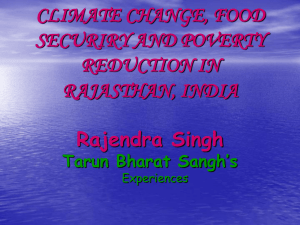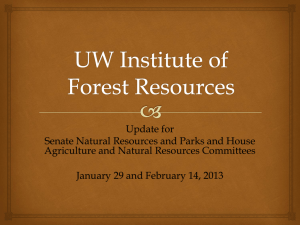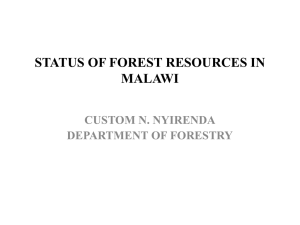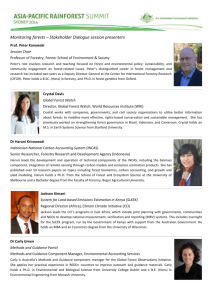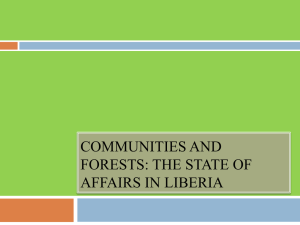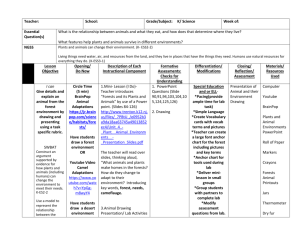Transcript - UBC Blogs
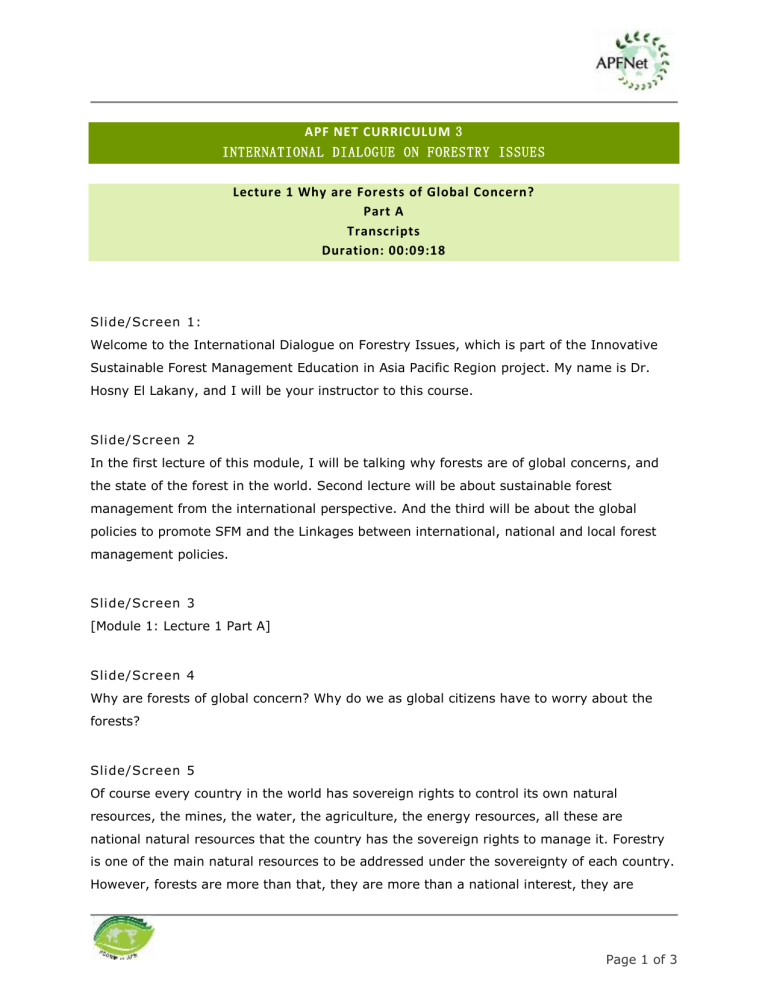
APF NET CURRICULUM 3
INTERNATIONAL DIALOG UE ON FORESTRY ISSUES
Lecture 1 Why are Forests of Global Concern?
Part A
Transcripts
Duration: 00:09:18
Slide/Screen 1:
Welcome to the International Dialogue on Forestry Issues, which is part of the Innovative
Sustainable Forest Management Education in Asia Pacific Region project. My name is Dr.
Hosny El Lakany, and I will be your instructor to this course.
Slide/Screen 2
In the first lecture of this module, I will be talking why forests are of global concerns, and the state of the forest in the world. Second lecture will be about sustainable forest management from the international perspective. And the third will be about the global policies to promote SFM and the Linkages between international, national and local forest management policies.
Slide/Screen 3
[Module 1: Lecture 1 Part A]
Slide/Screen 4
Why are forests of global concern? Why do we as global citizens have to worry about the forests?
Slide/Screen 5
Of course every country in the world has sovereign rights to control its own natural resources, the mines, the water, the agriculture, the energy resources, all these are national natural resources that the country has the sovereign rights to manage it. Forestry is one of the main natural resources to be addressed under the sovereignty of each country.
However, forests are more than that, they are more than a national interest, they are
Page 1 of 3
international, they are cross-bordered, for many reasons. First, because forest dwellers, especially indigenous people, and forest communities at large, move across national borders in many countries or many regions of the world almost freely, especially in the nomadic and some of the private areas in the tropical forests, you’ve seen people moving across the borders, it could be for hunting, for gathering food, or even sometimes cutting timber without really being stopped because this is the natural area and this is where they were born and they have lived for maybe hundreds, could be thousands of years before these national borders were kind of implemented. So any issue to do with indigenous people across the border is very important to deal with internationally. Second, the emission of
GHGs, which contributes to global warming and climate change, could be initiated in one location but its effect would be extended nationally and internationally. The forest fires or burning the forests to clear the forests in some parts of south East Asia, it happened several times, affects many countries in the vicinity and even hundreds, could be thousands of miles away from the location of the burning forests. As a result, the efforts to find an adaptation technology or an adaptation policy and mitigation of climate change also poses some global challenges because if you deal with deforestation in one region, other regions may be continuing to do deforestation and the effects emission of GHGs would be more or less universal. Similarly, the watersheds cross borders, the water could originate in the upstream in one country or more than one country and then the water flows downstream to another country or other countries. And many countries in the world share the same water resources, if you look at the major river systems in the world, they are just cross-bordered, there are many countries share the same water basin. Fourth reason why forest should be dealt with internationally is that the ecosystem and the biodiversity and the people they contain, they also cross borders. If you look at the distribution of some tree species, some forest species, some animals, some plants, insects, all the components of biodiversity and ecosystems, you find them in most cases, they cross borders. It could be one forest ecosystem, could be crossing the borders of maybe two or four or five or ten countries even.
And that is why when we deal with the forest as ecosystem, there are some protections and so on, borders between countries do not make big difference except when we get to the sovereign rights of each country, but the ecosystem itself does not know borders. Similarly with forest fires, pests and diseases, they frequently cross borders. It can have fire starting in one country and spreading to another country, and the same goes with pests and diseases. They don’t need passports to cross borders like human beings. So the efforts to control or manage these natural disasters, it has to be internationally, because sometimes one country cannot deal with this, like forest fires, for example, when they cross the
Page 2 of 3
borders, go to the neighbor countries, there should be international efforts to deal with that.
Number six is that the timber and non-timber forest products sourcing, processing and trade are globalized now. So many countries, so many companies, they obtain raw materials from timber or non-timber forest products. They source them or they buy them from one country, or they grow them in one country, or harvest them in one country and then, they may process them in the same country or in another country, and most likely the trade would be a group of countries. So the process of timber sourcing and this goes for non-timber forest products. Timber trade is definitely an international or globalized business; even in Europe some countries stopped harvesting their forests at the very high rate, that they used to do 20 or 30 years ago, and now they source their timber and raw materials from other countries or other concessions in South America or in Africa. And finally the forest education and employments are becoming increasingly international. If you look at our university, University of British Columbia and the forestry school, we see so many nationalities, our local students, our national students, in addition to students from many many nationalities, and most likely, the graduates of forestry, would be working outside of their home countries. Now we expect at least 50% of our graduates, they would be working internationally. And that’s why we added this international dimension to the forestry education. And so many graduates would be working for consulting companies, for example, timber companies who have business outside of their base country. Many companies now they operate internationally and that’s why it’s important for our students to know more about the international seeing for the future point.
Slide/Screen 6
[End of Module 1, Lecture 1, Part A. Thank you for watching.]
Page 3 of 3

